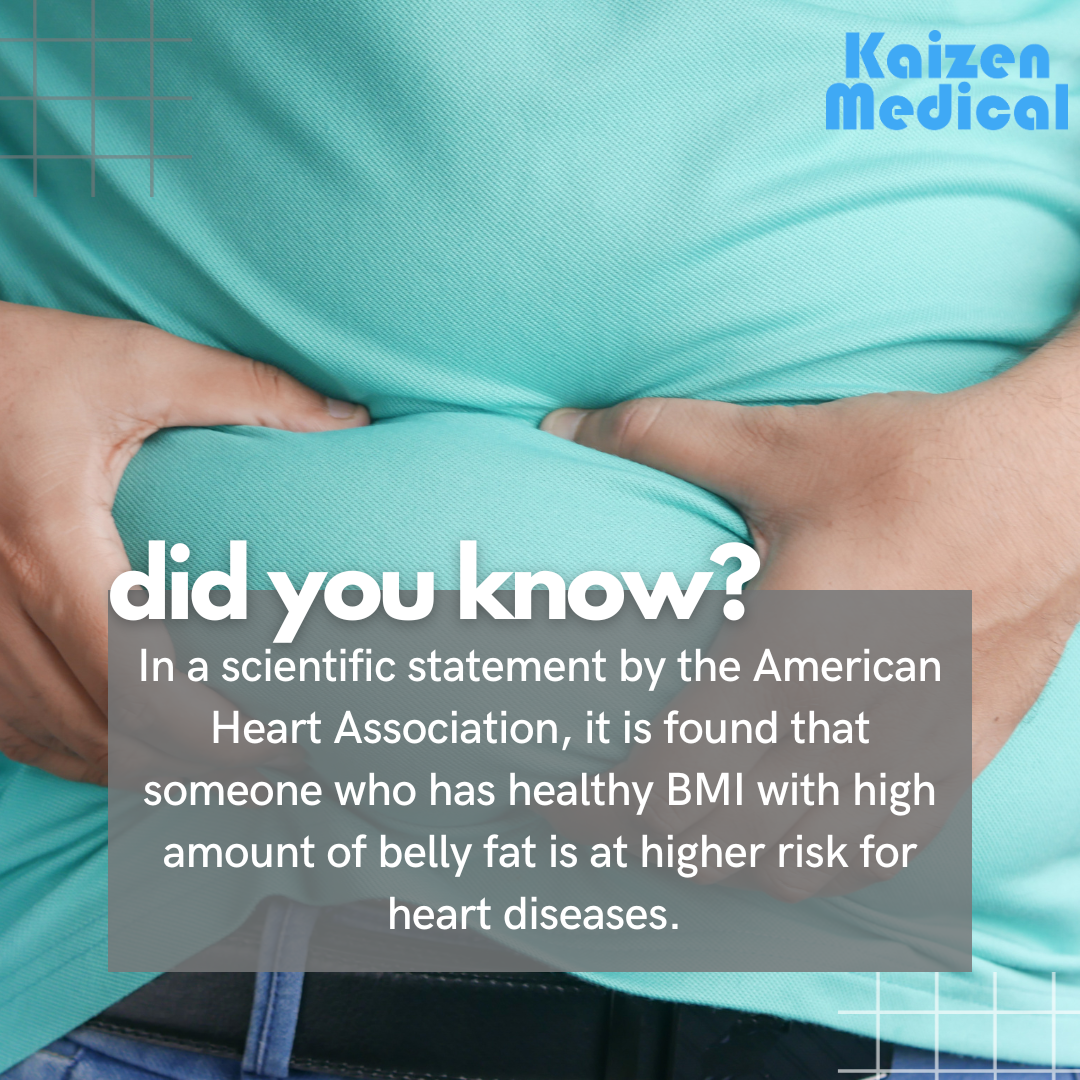There are several ways to determine if someone is overweight. A common method is by using the Body Mass Index (BMI) when you take a person’s weight in kilograms (or pounds) divided by the square of height in meters (or feet).
A high BMI can indicate high body fatness. However, an acceptable BMI does not necessary mean that a person is healthy. In a scientific statement[1] by the American Heart Association, it is found that someone who has healthy BMI with high amount of belly fat is at higher risk for heart diseases. And sometimes, the inverse can be true- very muscular people may have a high BMI, but low body fat.
Hence, another way to assess if a person is overweight, or at risk of developing cardiovascular diseases or diabetes is by measuring the waist circumference. The ideal measurement for women is below approximately 80 centimetres, and below 94 centimetres for men.
Lower your weight, lower your risk!
To lower one’s risk of suffering from complications of overweight and obesity, such as the metabolic syndrome and or heart diseases, one would need to shed the extra weight, especially at the belly. Taking a two-pronged approach – exercising and dietary adjustment – can be effective in achieving significant weight loss for overweight individuals.
A study[2] by Peter Deibert showed participants successfully lost weight by engaging in sports three times a week for a minimum of 150 minutes weekly, including walking and strength training. Additionally, following a high-protein diet was found to be beneficial.
Strength training is an important component of weight loss. Increasing muscle mass can help increase energy consumption, even at rest. This is important to prevent muscle loss during a diet and avoid the classic yo-yo effect, where weight is regained after losing muscle mass.
Recommended exercises for overweight individuals
In terms of suitable sports for overweight individuals, best are activities that do not require carrying body weight, such as swimming, aqua fitness, cycling, and walking. Sports with fast start-stop movements or jumps, like tennis, are dangerous as they can put excessive strain on joints. Football is a popular sport, but it may not be optimal for overweight individuals due to its contact nature and the strain it puts on ligaments and joints.
Oveweight individuals should consider medical check-ups, such as a sports suitability examination and a stress EKG, before starting a new sport. These can help identify any underlying health issues or areas that may need strengthening before engaging in certain activities.
What about the diet?
In terms of nutrition, it is good to follow a Mediterranean diet, which includes plenty of vegetables, fruit, and healthy fats. One should consume less energy than needed and consider one’s lifestyle and meal frequency.
The outdated recommendation of eating small portions five times a day can cause weight gain. Instead, individuals should assess their meal needs and consider omitting or reducing carbohydrate intake at dinner.
Starting from young
Modern society also faces an increasing problem of obesity in children. Here, we recommend sports that are enjoyable and not overly competitive for overweight children, such as Frisbee, Speedminton, badminton, Hula-Hoop, roller skating, and inline skating. It is important for parents to be involved and ensure that children engage in regular physical activity, as school sports alone may not be sufficient.
Access to sports clubs or equipment can be a barrier for some families due to financial constraints. We therefore need open spaces and facilities in communities that provide opportunities for children and young people to engage in physical activity together.
[1] https://www.ahajournals.org/doi/full/10.1161/CIR.0000000000000973
[2] https://www.ncbi.nlm.nih.gov/pmc/articles/PMC4690052/
About Dr Adrian Mondry
Dr Adrian Mondry is a Hypertension Specialist accredited by the German Hypertension League in Singapore. He was previously a senior consultant in the department of medicine at the National University Hospital and Ng Teng Fong General Hospital (NTFGH), Dr Mondry has more than 30 years of experience in the field of internal medicine.
Dr Adrian Mondry is recognised for his leadership and contributions in establishing the dedicated hypertension clinic within the National University Health System and fast-track deep vein thrombosis service at NTFGH.
Dr Adrian Mondry is fluent in English, German and French.
About Kaizen Medical
Kaizen Medical is located at Mount Elizabeth Novena Specialist Centre, Suite 11-57.
At Kaizen, we provide in depth health care to patients with multi-organs diseases; tackling undifferentiated presentations that cannot be easily assigned to a single organ.





